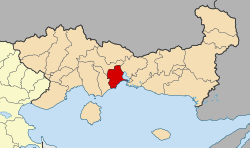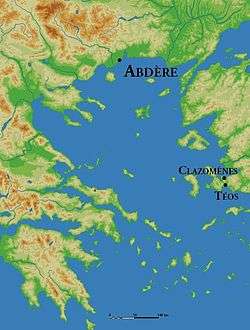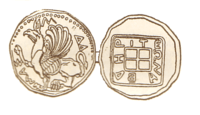Abdera, Thrace
| Abdera Άβδηρα | |
|---|---|
|
Remains of the ancient city of Abdera. | |
 Abdera | |
|
Location within the region  | |
| Coordinates: 40°57′N 24°59′E / 40.950°N 24.983°ECoordinates: 40°57′N 24°59′E / 40.950°N 24.983°E | |
| Country | Greece |
| Administrative region | East Macedonia and Thrace |
| Regional unit | Xanthi |
| Area | |
| • Municipality | 314.8 km2 (121.5 sq mi) |
| Population (2011)[1] | |
| • Municipality | 19,005 |
| • Municipality density | 60/km2 (160/sq mi) |
| • Municipal unit | 3,341 |
| Community | |
| • Population | 1473 |
| Time zone | EET (UTC+2) |
| • Summer (DST) | EEST (UTC+3) |
| Vehicle registration | AH |
Abdera (Ancient Greek: Ἄβδηρα) was a major Greek polis on the coast of Thrace. It lay 17 km east-northeast of the mouth of the Nestos River, almost directly opposite the island of Thasos. The site now lies in the Xanthi regional unit of Thrace, Greece. The municipality of Abdera (Modern Greek: Άβδηρα [ˈavðira]) has 19,005 inhabitants (2011).
History


Its mythical foundation was attributed to Heracles who founded the city on behalf of his fallen friend Abderus.[2] The historical founding is traced back to a colony from Klazomenai. This historical founding was traditionally dated to 654 BC, which is unverified, although evidence in 7th century BC Greek pottery tends to support it.[3] But its prosperity dates from 544 BC, when the majority of the people of Teos (including the poet Anacreon) migrated to Abdera to escape the Persian yoke (Herodotus i.168).[4] The chief coin type, a griffon, is identical with that of Teos; the rich silver coinage is noted for the beauty and variety of its reverse types.
In 513 BC and 512 BC, the Persians conquered Abdera. In 896 BC, the Persians again conquered Abdera, this time under Darius I. It later became part of the Delian League and fought on the side of Athens in the Peloponnesian war.[5]
Abdera was a wealthy city, the third richest in the League, due to its status as a prime port for trade with the interior of Thrace and the Odrysian kingdom.[3]
A valuable prize, the city was repeatedly sacked: by the Triballi in 376 BC, Philip II of Macedon in 350 BC; later by Lysimachos of Thrace,[4] the Seleucids, the Ptolemies, and again by the Macedonians. In 170 BC the Roman armies and those of Eumenes II of Pergamon besieged and sacked it.
The town seems to have declined in importance after the middle of the 4th century BC. Cicero ridicules the city in his letters to Atticus, "Hic, Abdera non tacente me" [6] but the city counted among its citizens the philosophers Democritus, Protagoras[4] and Anaxarchus, historian and philosopher Hecataeus of Abdera, and the lyric poet Anacreon.

Abdera had flourished especially in ancient times mainly for two reasons : because of the large area of their territory and their highly strategic position. The city controlled two great road passages (one of Nestos river and other through the mountains north of Xanthi). Furthermore, from their ports passed the sea road, which from Troas led to the Thracian and then the Macedonian coast.[7]
The ruins of the town may still be seen on Cape Balastra (40°56'1.02"N 24°58'21.81"E); they cover seven small hills, and extend from an eastern to a western harbor; on the southwestern hills are the remains of the medieval settlement of Polystylon.
Municipality
The municipality Abdera was formed at the 2011 local government reform by the merger of the following 3 former municipalities, that became municipal units:[8]
The municipal unit Abdera is subdivided into the communities Abdera, Mandra, Myrodato and Nea Kessani. The community Abdera consists of the settlements Abdera, Giona, Lefkippos, Pezoula and Skala.
Avdhira occupies the area currently.[4]
Landmarks
- Archaeological Museum of Abdera
- Agios Ioannis beach (also Paralia Avdiron), near the village Lefkippos
References
- ↑ "Απογραφή Πληθυσμού - Κατοικιών 2011. ΜΟΝΙΜΟΣ Πληθυσμός" (in Greek). Hellenic Statistical Authority.
- ↑ Pseudo-Apollodorus, Bibliotheca, ed. Wagner, R. Leipzig: Teubner, 1894; Mythographi Graeci 1, Chapter 2, section 97, line 7ff.
- 1 2 Hornblower, Simon (1996). "Abdera". The Oxford Classical Dictionary. Oxford: Oxford University Press. p. 1.
- 1 2 3 4 "Abdera". Encyclopædia Britannica. I: A-Ak - Bayes (15th ed.). Chicago, IL: Encyclopædia Britannica, Inc. 2010. p. 19. ISBN 978-1-59339-837-8.
- ↑ Diodorus Siculus, Bibliotheca historica, ed. Vogel, F., Fischer, K.T. (post I. Bekker & L. Dindorf), Leipzig: Teubner, 1:1888; 2:1890; 3:1893; 4–5:1906, Repr. 1964. Book 13, chapter 72, section 2, line 2.
- ↑ Cicero. Epistulae ad Atticum, 4.17.3, 7.7.4.
- ↑ D. C. Samsaris, Historical Geography of Western Thrace during the Roman Antiquity (in Greek), Thessaloniki 2005, p. 91-96
- ↑ Kallikratis law Greece Ministry of Interior (Greek)
Sources
- Grant, Michael. A Guide to the Ancient World. Michael Grant Publications, 1986.
 This article incorporates text from a publication now in the public domain: Chisholm, Hugh, ed. (1911). "Abdera". Encyclopædia Britannica 1 (11th ed.). Cambridge University Press. p. 33. Endnotes:
This article incorporates text from a publication now in the public domain: Chisholm, Hugh, ed. (1911). "Abdera". Encyclopædia Britannica 1 (11th ed.). Cambridge University Press. p. 33. Endnotes:
- Mittheil. d. deutsch. Inst. Athens, xii. (1887), p. 161 (Regel);
- Mém. de l'Acad. des Inscriptions, xxxix. 211;
- K. F. Hermann, Ges. Abh. 90-111, 370 ff.
 This article incorporates text from a publication now in the public domain: Herbermann, Charles, ed. (1913). "Abdera". Catholic Encyclopedia. New York: Robert Appleton.
This article incorporates text from a publication now in the public domain: Herbermann, Charles, ed. (1913). "Abdera". Catholic Encyclopedia. New York: Robert Appleton.
External links
- Richard Stillwell, ed. Princeton Encyclopedia of Classical Sites, 1976: "Abdera, Thrace, Greece"
- Hellenic Ministry of Culture on Abdera
- Avdera.gr (Greek)
| ||||||||||||||||||||||||||||||||||||||
| ||||||||||||||
